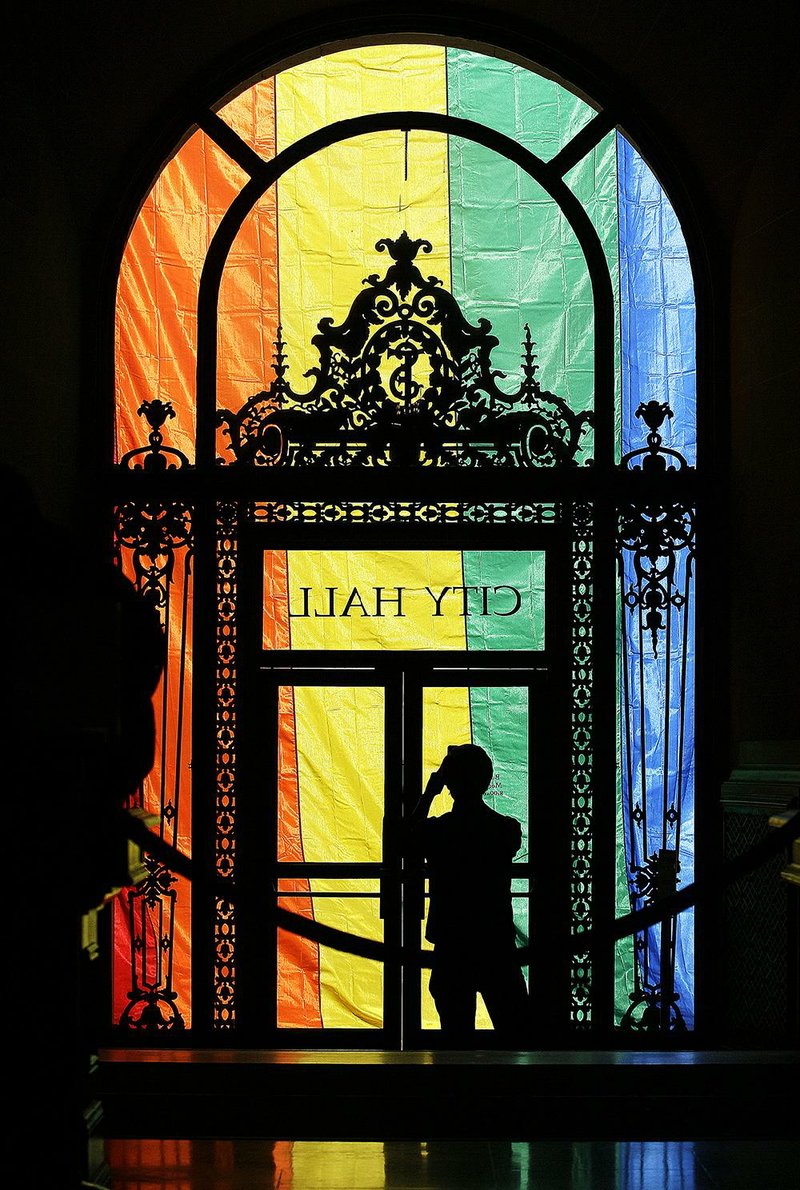LOUISVILLE, Ky. -- Gay couples across the South and Midwest celebrated the Supreme Court's same-sex marriage ruling Friday with spontaneous weddings. But several governors railed against the ruling, and clerks in some of the affected states refused to issue licenses.
In Kentucky, one of the 14 states that had not allowed same-sex marriages before Friday's ruling, Benjamin Moore and Tadd Roberts wore matching tuxedos to the county clerk's office in Louisville to get married. The mayor greeted them with a bottle of champagne.
"It's just been incredible and historic and amazing to live this moment," Moore said, after Mayor Greg Fischer took commemorative photos of Moore and Roberts getting their license.
The reaction wasn't as welcoming in all of the states that had been the last holdouts against same-sex marriages.
In states, some officials embraced the ruling while others resisted it.
In rural Alabama, Pike County Probate Judge Wes Allen said he would stop issuing all marriage licenses to avoid having to give them to gay couples. Allen said Alabama law gives judges the option of granting licenses, and "I have chosen not to perform that function."
Governors in Louisiana, Mississippi and Texas also railed against the ruling. And clerks in some of the affected states refused to issue licenses, citing a three-week grace period allowed by the Supreme Court or forms now out of date that specify "bride" and "groom."
In Mississippi, Attorney General Jim Hood said gay marriages could not start immediately, while attorneys for same-sex couples asked a federal appeals court to remove a procedural block that would allow the couples to wed. Three lesbian couples obtained licenses and married in Hattiesburg in the confusion.
The Human Rights Campaign sent letters to the governors of the 14 affected states warning that delaying issuing marriage licenses would be unlawful.
By Friday afternoon, couples had received licenses in all but one of the states, according to the Human Rights Campaign.
In Louisiana, where Republican Gov. Bobby Jindal is running for the White House as a conservative Christian, all gay couples were turned away.
The Supreme Court allows for a 25-day delay while it considers a rehearing. The Louisiana Clerks Association advised clerks to wait until then before issuing licenses.
Jindal issued a statement vowing to never stop fighting for "religious liberty."
"Marriage between a man and a woman was established by God, and no earthly court can alter that," he wrote.
In Texas, many counties held off on issuing same-sex marriage licenses until receiving guidance from Republican Attorney General Ken Paxton, who scolded the Supreme Court. The delay dragged on for hours in Houston, until the clerk relented and agreed not to wait for updated forms from the state.
Texas Gov. Greg Abbot also made a religious-freedom argument.
"No Texan is required by the Supreme Court's decision to act contrary to his or her religious beliefs regarding marriage," Abbot said.
He issued a memo saying the government should not pressure people to violate their "sincerely held religious beliefs." He later clarified that he does not condone discrimination or authorize state agencies to deny benefits to same-sex couples.
In other states, governors, even some who disagreed with the ruling, made decisive statements, calling gay marriage the law of the land and instructing their clerks to issue licenses right away.
Mass marriages were planned in Michigan, Ohio and Kentucky. People gathered across the nation to celebrate on courthouse lawns and city parks.
Minister Danielle Goeckel stood on the steps of the Fulton County Courthouse in Atlanta on Friday morning holding a sign reading: "Yes I will gladly marry you!"
The fee for her services? Two hugs.
In Alabama, where couples in some counties were told they would have to wait to wed, Jessica Dent and Carolee Taylor got married a few blocks from the courthouse in Montgomery.
"Never thought it would happen in our lifetime," Taylor said.
After their ceremony, they returned to the courthouse to file their license, making them officially married in the conservative state that had fought previous efforts to legalize gay marriage.
After a federal judge ruled earlier this year that the state's gay-marriage ban was unconstitutional, about 500 same-sex couples were married before the Alabama Supreme Court directly ordered probate judges to stop issuing the licenses.
"We waited so long. When it came through, I can't think of a better way to celebrate -- the decision and our love," Dent said.
Information for this article was contributed by Paul Weber, Kevin McGill, Bruce Schreiner, Emily Wagster Pettus and Jack Elliott Jr. of The Assocaited Press.
A Section on 06/27/2015


